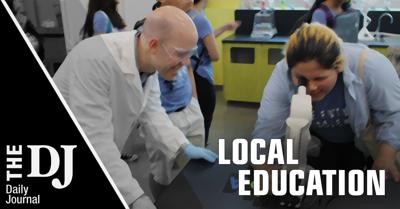A $298 million bond measure meant to support Redwood City School District infrastructure improvements will be coming before voters this November following unanimous support from trustees Wednesday night.
The measure, if approved by at least 55% of voters, would charge property owners in the district $24 per $100,000 of assessed property value, bringing in about $16 million annually for the district to spend on improvements. The owners of a property assessed at $1 million would have to pay $240 a year.
Those improvements would include upgrading or replacing aging classrooms, facilities and electrical, plumbing, heating and cooling systems, removing asbestos, upgrading safety and security systems, improving playground areas, installing energy efficiency equipment and systems, building staff housing and creating an overall modern learning environment.
“We are always looking to see how we can improve our schools and I think this is an opportunity for our community to invest in our children and our schools,” said board President Maria Díaz-Slocum.
The projects are part of Phase 1 in the district’s Facilities Master Plan, Díaz-Slocum said, noting her top concern is completing safety and security work like raising fences, installing classroom intrusion alarms and upgrading emergency communications and technology backup systems.
Some support for the bond measure was shared by members of the public during Wednesday’s meeting but not all community members back the decision. Chris Robell, the lone speaker against the bond measure, said he has a number of concerns that have been echoed by neighbors on platforms like Nextdoor and Facebook.
Given high inflation rates and the uncertain future of the economy, Robell questioned the district’s timing in asking residents to take on additional costs when wallets are already tight. Such measures can be difficult to campaign for during stable times, Robell said, arguing the district will have an even harder uphill battle this go around.
“This is a terrible time to be doing this,” Robell said while committing himself to going door to door alerting property owners of what the bond will cost them over its 40-year lifetime. “It’s expensive, it’s unfair and it’s anti-housing because everyone will pay for it.”
Sequoia Union High School District trustees also voted to place a $591.5 million bond measure on the November ballot, costing residents $14 per $100,000 assessed property value per year, the lowest of three options. If approved, Robell noted residents living in both districts will pay a combined tax rate of $38 per $100,000 with rates going up by 2% annually.
Had the district not moved forward now with the bond measure though, Díaz-Slocum said the cost of construction would only increase, creating even greater financial burdens later on while district facilities continued to age.
“We’re two different districts with two different needs and to me this is an opportunity. We need to improve facilities and children can’t learn if the classroom is too hot and we can’t provide them with what they need,” Díaz-Slocum said. “This is just a continuation of the plan we set out to improve all our schools.”
Recommended for you
Robell said he would have supported a funding measure had the district proposed a parcel tax instead of a bond, given that seniors and those living on Social Security could qualify for exemptions and the district wouldn’t be taking on debt during a period of high interest rates.
Those funds could also be used to support staff and administrative salaries and programming, two areas bonds can’t cover that Robell said would actually improve student outcomes. Robell also argued better student performance would keep families from leaving the district which has seen enrollment fall over the years.
A more tailored measure that asked taxpayers to back the cost of only the most essential upgrades and more specifically outlined how those improvements would improve student outcomes would have also been preferred, Robell said.
“These are all things that are hard to say no to and you want to invest in children and education. But my concern is, you don’t have unlimited funds so how do you do it more cost efficiently?” Robell said. “We can’t get everything so what do we do to maximize whatever the goal is and in this case student outcomes.”
But Díaz-Slocum argued that improved infrastructure is key in creating a healthy and safe learning environment where students can perform their best. Without it, she said students will be distracted and left without the resources they need to learn.
Without moving forward with the bond or if it were to fail, Díaz-Slocum said urgent improvements will have to be paused as officials go back to the drawing board and cost of construction increases.
And while student enrollment is on the decline, Díaz-Slocum said the state’s universal transitional kindergarten program will funnel more students into the district’s classrooms.
“You have to work hard to get the message to the voters. We are in hard financial times but, you know, things are getting more expensive every day,” Díaz-Slocum said. “We’re always looking where we can to save money and if there’s an opportunity to return money to the voters we’ll do that as well.”
(650) 344-5200 ext. 106

































(1) comment
No senior exemption? There's too much politics involved to reward the district with this handout. Too concerned about spreading PC propaganda. We need to be pro-choice with our education dollar.
Welcome to the discussion.
Log In
Keep the discussion civilized. Absolutely NO personal attacks or insults directed toward writers, nor others who make comments.
Keep it clean. Please avoid obscene, vulgar, lewd, racist or sexually-oriented language.
Don't threaten. Threats of harming another person will not be tolerated.
Be truthful. Don't knowingly lie about anyone or anything.
Be proactive. Use the 'Report' link on each comment to let us know of abusive posts.
PLEASE TURN OFF YOUR CAPS LOCK.
Anyone violating these rules will be issued a warning. After the warning, comment privileges can be revoked.